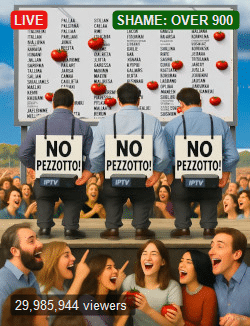 With an industrial-scale Piracy Shield blocking program not quite the panacea some had predicted, Italian authorities and rightsholders have recently upgraded their deterrent messaging capabilities.
With an industrial-scale Piracy Shield blocking program not quite the panacea some had predicted, Italian authorities and rightsholders have recently upgraded their deterrent messaging capabilities.
After a database of 2,200 individuals who subscribed to a pirate IPTV service was obtained by police during the course of a raid, authorities made good on their promise to issue fines to those exposed.
For some of those who accepted responsibility and settled their debt to society, a hard lesson had been learned. In a letter delivered to their homes recently, the head of DAZN explained the details of a new lesson to the same people. Previously fined recipients were provided an opportunity to pay DAZN an additional €500, this time to head off a possible claim for damages.
Lesson 3: Shame and Suffering, Respectfully
At the recent Sky Up The Edit event, part of a project championing digital inclusion, respect, and sports values, Minister for Sport and Youth, Andrea Abodi, spoke about the importance of respect.
“We must practice it, it’s an idea that can’t just fade away,” he said. “The more we respect ourselves and others, the better our quality of life.”
Sports content creator Lisa Offside spoke a little about social media, where respect can be in short supply.
“I’m realizing that negative comments define the person making them more than the person receiving them,” she said.
The minister wholeheartedly agreed. “You don’t have to respond to disrespect with disrespect: it’s a demonstration of strength and inner peace. We must continue to set a good example.”
IPTV Piracy is Disrespectful to Sport and the Economy
With the state and DAZN currently setting a different kind of example in respect of a couple of thousand luckless IPTV subscribers, Minister Abodi explained that buying pirate subscriptions isn’t simply being disrespectful to sport.
“We must be aware that buying an illegal ticket, piracy, means helping criminal economies. We must understand that we all become accomplices to this crime,” he warned.
Unlikely to do much to foster inner peace among those targeted, a new deterrent measure revealed by Minister Abodi suggests that setting an example doesn’t have to take place in private.
“I believe the names of those who buy illegal tickets may soon be published. It’s beyond privacy concerns, it’s a crime. I hope people understand that perhaps it’s better to spend a few euros more and avoid running into problems,” he added.
Pay Now or Pay More Later
While the ‘name-and-shame’ component is new, the advice from the minister is not dissimilar from that outlined in DAZN’s letter. In general terms, people are free to make their own choices; however, should they choose to pirate rather than buy a legal product (or settle a claim in DAZN’s case), it only gets more expensive when people get caught later on.
“It might seem, in some cases, like bravado,” Abodi explained. “My son also tried it, and I explained to him that it’s not just about taking money away from football.”
Italy’s Minister for Sport presented the new Sports Decree during the summer, which aims to pump money into the sport, in part by revisiting policies that have reportedly hurt the clubs financially.
In a move designed to suppress problem gambling, in 2018 Italy passed the Dignity Decree which imposed a blanket ban on gambling advertising and sports sponsorships. According to almost everyone, the decree hit revenues very hard indeed, so gambling operators are now being invited back after six years.
During that period, infamous betting operator 1xBet was the Presenting Partner of Serie A, Italy’s top football league.
1xBet logos were displayed on virtual advertising boards during matches but were only seen by overseas viewers due to the decree addressing problem gambling at home.
From: TF, for the latest news on copyright battles, piracy and more.
Powered by WPeMatico
